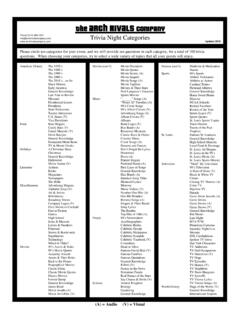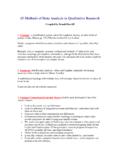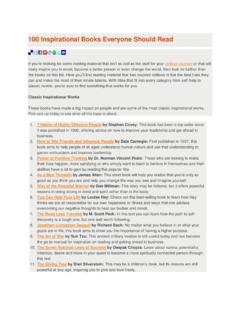Transcription of Biographical research - urbanlab.org
1 Biographical researchPrinciples and Practice inSurvey ResearchBRIAN ROBERTSOpen University PressBuckingham Philadelphia00 Prelim (ds) 4/10/01 10:38 am Page iiiThis book is dedicated to Evan and Mary for life,care and memoriesOpen University PressCeltic Court22 BallmoorBuckinghamMK18 1 XWemail: wide web: Chestnut StreetPhiladelphia, PA 19106, USAF irst published 2002 Copyright Brian Roberts, 2002 All rights reserved. Except for the quotation of short passages for the purpose ofcriticism and review, no part of this publication may be reproduced, stored in aretrieval system, or transmitted, in any form or by any means, electronic,mechanical, photocopying, recording or otherwise, without the prior writtenpermission of the publisher or a licence from the Copyright Licensing AgencyLimited.
2 Details of such licences (for reprographic reproduction) may be obtainedfrom the Copyright Licensing Agency Ltd of 90 Tottenham Court Road, London,W1P catalogue record of this book is available from the British LibraryISBN 0 335 20286 1 (pb)0 335 20287 X (hb)Library of Congress Cataloging-in-Publication DataRoberts, Brian, 1950 Biographical research /Brian cm. (Understanding social research )Includes bibliographical references (p. 178) and 0-335-20287-X ISBN 0-335-20286-1 (pbk.)1. Biography research Methodology. 2. Biography as a literaryform. I. Title. II. 2001808 .06692 dc212001021067 Typeset by Type Study, ScarboroughPrinted in Great Britain by Biddles Ltd, Guildford and Kings Lynn00 Prelim (ds) 4/10/01 10:38 am Page ivContentsSeries editor s forewordixAcknowledgementsxi1 Introduction: Biographical research1 Biographical research .
3 Defining the field1 The development of Biographical research3 Methodological issues6 The researcher s role13 Theoretical approaches14 Biographical research15 Recommended reading172 Uses of Biographical research 18 Uses of Biographical research18 Disciplines and contexts22 Education23 Oral history24 Health and ageing25 Feminist research28 Narratives of the body and sexuality29 Autobiography and biography3000 Prelim (ds) 4/10/01 10:38 am Page vConclusion31 Recommended reading313 The life history33 The life history33 Individual lives and social structures34 Life history data and method37 Deviance, career, becoming40 Case studies42 Types of interpretation46 Conclusion50 Recommended reading514 Autobiography and biography 52 Autobiography and biography definitions52 Genre56 Issues in autobiography and biography60 Letters, diaries.
4 Memoirs and other personal artefacts 62 Case study66 Fiction and non-fiction69 Conclusion71 Recommended reading725 Auto/biography and sociology73 Auto/biography definitions and relations73 Individual experiences and auto/ Biographical writing75 Feminism and auto/biography77 Intertextuality written and oral texts78 Hermeneutics, phenomenology and narrative texts80 Time perspectives Mead, Schutz and Ricoeur82 The researcher as an auto/biographer84 The researcher and the researched subject87 Individual lives and social lives88 Case study88 Conclusion91 Recommended reading926 Oral history93 Oral history definitions93 Uses and types of oral history95 Origins97 Development and purpose99 Ethics104 Evidence, truth and the researcher104viBiographical research00 Prelim (ds) 4/10/01 10.
5 38 am Page viPolitical standpoint107 Case study110 Conclusion113 Recommended reading1137 The narrative analysis of lives 115 Narrative analysis definitions115 Narrative analysis117 Time and narrative123 Myth and narrative124 Case study128 Other models of life study130 Conclusion132 Recommended reading1338 Memory and autobiography 134 Types of memory134 The social transmission of memories140 Case study142 Family and group memories144 Public and private memories145 Methodological issues: recollection and selectivity147 Conclusion148 Recommended reading1499 Ethnography and Biographical research 151 Fieldwork, ethnography and participant observation definition and practice152 research roles152 Methodological issues153 Ethnography and key informants154 Reflexivity and the researcher s life experience of ethnography157 Ethnographic texts160 Case study162 Oral traditions and biography164 Conclusion165 Recommended reading16610 Conclusion167 Disciplines169 The Biographical turn169 Identity170 Time171 Memory172 Contentsvii00 Prelim (ds) 4/10/01 10.
6 38 am Page viiResearcher s self172 Methodology173 New technology173 Conclusion174 Recommended reading175 Glossary176 References178 Index200viiiBiographical research00 Prelim (ds) 4/10/01 10:38 am Page viiiSeries editor s forewordThis Understanding Social research series is designed to help students tounderstand how social research is carried out and to appreciate a variety ofissues in social research methodology. It is designed to address the needs ofstudents taking degree programmes in areas such as sociology, social policy,psychology, communication studies, cultural studies, human geography,political science, criminology and organization studies and who are requiredto take modules in social research methods.
7 It is also designed to meet theneeds of students who need to carry out a research project as part of theirdegree requirements. Postgraduate research students and novice researcherswill find the books equally series is concerned to help readers to understand social researchmethods and issues. This will mean developing an appreciation of the pleas-ures and frustrations of social research , an understanding of how to imple-ment certain techniques, and an awareness of key areas of debate. Therelative emphasis on these different features will vary from book to book,but in each one the aim will be to see the method or issue from the positionof a practising researcher and not simply to present a manual of how to steps.
8 In the process, the series will contain coverage of the major methodsof social research and addresses a variety of issues and debates. Each bookin the series is written by a practising researcher who has experience of thetechnique or debates that he or she is addressing. Authors are encouraged todraw on their own experiences and inside Prelim (ds) 4/10/01 10:38 am Page ixThis new book on Biographical method is very timely and very much inline with the goals of the Understanding Social research series. BrianRoberts has been engaged in Biographical research for many years and istherefore able to draw upon a great deal of experience and expertise in writ-ing this book.
9 However, at the time that he began his work in this area, themethod was still in a relatively underdeveloped state. This is not to say thatthe Biographical method is new it manifestly is not, as anyone with just apassing acquaintance with the history of social research will know. The lifehistory method has been with us for decades. But in the last ten to fifteenyears, the Biographical method (as it is increasingly referred to) has becomean extremely significant approach to social research . This surge of interestin the method can be attributed to a variety of factors: a developing dis-illusionment with static approaches to data collection; a growing interest inthe life course; an increased concern with lived experience and how best toexpress and reveal it; and, of course, the method has shared in the growth inpopularity of qualitative research in is in this sense that Brian Roberts s book is very timely.
10 He brings a greatawareness of the different ways in which the Biographical method can beexecuted, but he does so at a time when there is burgeoning interest in whatthe method entails. His approach indicates a critical awareness of the differ-ent ways of doing Biographical research . Such an awareness comes aboutfrom being steeped in the method in its many forms. He uses many examplesto illustrate his key points, including his own research . It is precisely thiskind of style that I have been keen to develop in the series clear expositionsof particular methods coupled with the injection of writers own researchexperiences into those one of the biggest difficulties that many of us face when thinkingor writing about Biographical research is what makes it distinctive.




